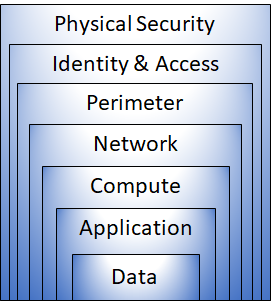Defense-in-depth strategy
The objective of defense-in-depth is to protect information and prevent it from being stolen by those who aren't authorized to access it.
Defense-in-depth is a set of layers, where each layer is an additional protection.

This approach has several advantages:
- it does not rely on a single security layer;
- it slows down attacks, given that there are more layers to be attacked,
- it provides automatic alerts
Each layer has a specific purpose.
Physical security
It's the security of the physical assets (buildings, hardware, datacenter).
The intent is to prevent assets from being damaged or stolen.
Identity and access
The identity and access layer ensures that identities are secure, that access is granted only to what's needed, and that sign-in events and changes are logged.
At this layer, it's important to:
- Control access to infrastructure and change control.
- Use single sign-on (SSO) and multifactor authentication.
- Audit events and changes.
Perimeter
Protects from network-based attacks against your resource, such as [[DDoS]] attacks and other malicious attacks.
It uses a DDoS filter and other technologies, such as a [[firewall]].
Network
Limits the network connectivity across all your resources to allow only what's required. By limiting this communication, you reduce the risk of an attack spreading to other systems in your network.
It defines several restrictions to avoid malicious access to resources, such as:
- Limit communication between resources.
- Deny by default.
- Restrict inbound internet access and limit outbound access where appropriate.
- Implement secure connectivity to on-premises networks.
Compute
Secure existing computing resources, such as Virtual Machines and Endpoints.
Application
Every development team should ensure that its applications are secure by default.
At this layer, it's important to:
- Ensure that applications are secure and free of vulnerabilities.
- Store sensitive application secrets in a secure storage medium.
- Make security a design requirement for all application development.
Data
Ensure that data is stored properly, with the correct level of confidentiality, integrity, and availability.